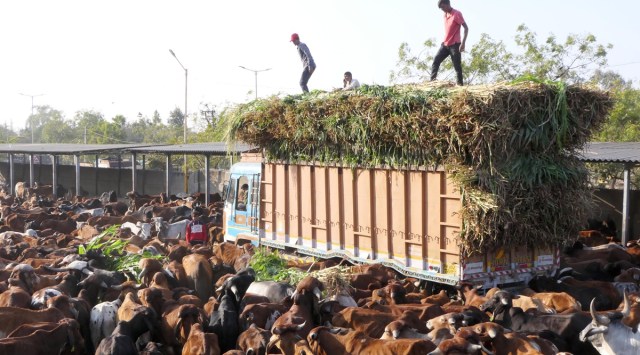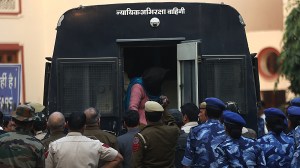NGO that took over RMC’s cattle pound seeks govt help
The NGO took over the cattle pound on Bhavnagar Road early in October 2022, after it emerged as the bidder who had demanded the lowest grant for maintenance of cattle impounded by the civic body.
 At the RMC cattle pound on Bhavnagar Road in Rajkot. (Express Photo)
At the RMC cattle pound on Bhavnagar Road in Rajkot. (Express Photo)A few months after it took over the maintenance of around 1,700 cattle heads in the cattle pound of the Rajkot Municipal Corporation (RMC), city-based Jeevadaya Ghar (JG), an non-governmental organisation (NGO) working for welfare of animals has applied for availing benefit of Mukhyamantri Gaumata Poshan Yojana (MGPY).
The NGO took over the cattle pound on Bhavnagar Road early in October 2022, after it emerged as the bidder who had demanded the lowest grant for maintenance of cattle impounded by the civic body. It had offered to do the work for a grant of Rs 50 per day per adult cattle and Rs 35 per day per calf. Subsequently, the RMC and JG signed an MoU on October 4, 2022.
“The average cost for the RMC for maintaining the impounded cattle was around Rs 30 lakh per month and this was going up as we intensified our drive to impound cattle straying on city roads. As it was a government facility, nobody used to give donations even though there is a lot of focus on cow protection in recent years. Therefore, we decided to hand the cattle pound over to some charitable organisation to convert it into a gaushala or panjrapole and to be run through charity and some institutional support,” said an RMC officer.
As part of the MoU, JG is responsible for maintaining around 1,700 cattle heads presently in the pound. The number keeps fluctuating as RMC keeps impounding more stray cattle and sending many of them to guashalas for permanent rehabilitation.
JG, which was established in 1970, has converted the cattle pound into a panjrapole. In Gujarat, panjrapoles are charitable establishments taking care of all types of animals and birds in need of help.
“The grant we are getting from the RMC for maintenance of these cattle is proving insufficient due to inflated fodder prices. While the RMC provides us average Rs 42.5 per cattle head, the actual cost comes to around Rs 70. Therefore, every month, we are running a deficit of funds to the tune of around Rs 8 lakh,” said Rajendra Shah, trustee of GJ.
Shah, who served as the manager of the Rajkot Mahajan panjrapole for several years, says that green fodder prices are ruling at around Rs100 per mann (20 kg) while hay is selling at around Rs 250 per mann. He says that till around a year ago, prices used to be half of today’s levels.
“Prices have been at this level for six months as fodder cultivation area has declined. Farmers sowed more cotton, thanks to better prices of that crop. Therefore, fodder growers have increased prices by Rs 3 per mann. Labour charges for cutting green fodder, too, have gone up from Rs 7 per mann to Rs10 per mann and transportation charges have also increased by Rs 3 due to high diesel prices. All these pushed fodder prices up,” said Ketan Sanja, a fodder trader at the fodder market on the old yard of agricultural produce market committee (APMC) in Rajkot.
The MoU doesn’t have a clause to revise the daily maintenance grant paid by the RMC, and therefore, the charitable trust has now sought the state government’s help. It has applied to avail benefit of MGP, a scheme launched by the state government last year, promising Rs 30 per cattle head per day assistance to gaushalas and panjrapoles.
Shah, who is a member of the National Animal Welfare Board as well as Gujarat State Animal Welfare Board has also made representations to Agriculture and Animal Husbandry Minister Raghavji Patel.
“Donations have normalised now as businesses have overcome the Covid-19 shock. But there is a limit to one’s capacity to give to charity… the number of cattle that we are taking care of is big and at current levels of fodder prices, our activity may not remain sustainable for long. Therefore, we have requested the state government for help under the PGPY,” said Shah, adding JG’s application seeking registration under the Foreign Currency Regulation Act (FCRA) has been pending with the Central government for a year.
Following RMC’s example, Bhavnagar Municipal Corporation has also entered into a similar MoU with a charitable organisation to take care of its cattle pound.
Om Vachchhraj Gaushala Charitable Trust is also taking care of around 300 cattle heads in another cattle pond of RMC in Ronaki village since October 2022, after signing a similar MoU with the civic body. “But apparently, that organisation isn’t facing any major issue because the number of cattle heads there are only around 300 whereas in the pound on Bhavnagar Road, it is six times more and 80 per cent cost of maintaining these animals is towards fodder,” said the RMC officer.







